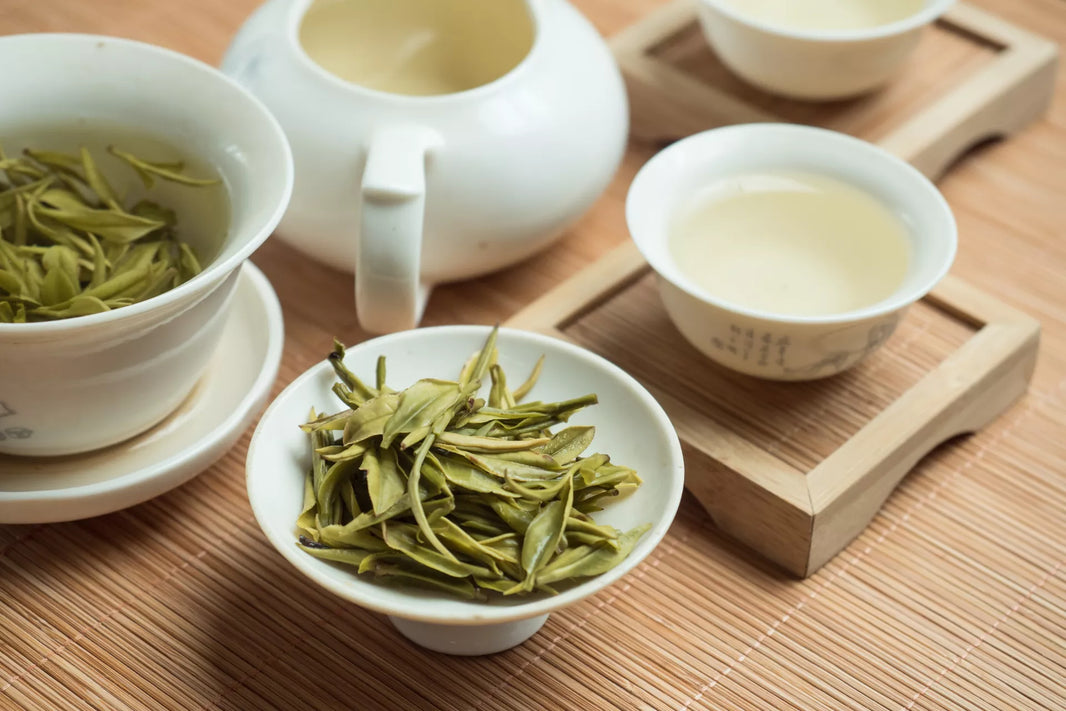Green tea leads among the healthiest beverages due to its many potential health benefits. The use of unoxidized Camellia sinensis leaves for beverage making is centuries old. Today, you can intake green tea in beverages, as a dietary supplement, or as a topical ointment.
Studies show that green tea benefits include antioxidation, support for cognitive function, energy boosting, weight management, and some protection against certain types of cancer.
Here are 15 potential health benefits of green tea.
1. Contains antioxidants
Green tea benefits you with plant-based antioxidants. It contains polyphenols, especially EGCG catechins, an antioxidant that helps prevent cell damage and inflammation. These antioxidants may help reduce the risk of cancer and heart disease.
2. Boosts cognitive function
Drinking green tea benefits you by stimulating the central nervous system. It helps to increase neurotransmitter production. Green tea has caffeine and L-theanine compounds that can improve focus and concentration.
3. Helps to alleviate anxiety and stress
The L-theanine compound in green tea benefits users by helping to ease stress and anxiety. Research indicates that L-theanine is a stimulant that enhances brain function, mood, and concentration.
4. Lowers the risk of some cancers
A study suggests that the anti-inflammatory properties of green tea have the potential to minimize inflammation caused by cell-damaging free radicals. The anti-inflammatory effect of green tea may lower the risk of some cancers, including;
-
Breast cancer
-
Colon cancer
-
Esophageal cancer
-
Liver cancer
-
Lung cancer
-
Prostate cancer
-
Stomach cancer
5. Can help in weight management
There is some speculation that green tea can aid in the breakdown of body fat and increase metabolism, both of which contribute to weight loss. A study in Korea shows that women had 44% less abdominal fat than their male counterparts. However, dieting and exercise remain the core mitigating strategies against obesity.
6. Has potential benefit in oral health
Using green tea benefits your oral health. The product has antibacterial properties that prevent the growth of plaque-causing bacteria. Green tea also prevents bad breath, tooth decay, and gum inflammation. For optimal oral health, consume a proper diet and maintain regular oral hygiene routines.
7. May help in the management of blood sugar
Another benefit of green tea is its potential to manage blood sugar levels. Green tea may help manage and prevent type 2 diabetes. There is some evidence suggesting that the antioxidants in green tea may help reduce insulin resistance, a significant factor contributing to type 2 diabetes.
8. May lower the risk of heart disease
Several studies show that green tea benefits include lowering cholesterol levels. High cholesterol can block your arteries, increasing the risk of heart disease and a heart attack.
The antioxidants and other catechins in green tea help lower low-density lipoprotein (LDL) and total cholesterol levels. It also contains flavonoids, such as quercetin and theaflavins, that help dilate blood vessels and maintain their flexibility.
9. May improve Longevity
Drinking green tea can benefit you with a healthier, longer life. Green tea polyphenols have anti-ageing effects. Polyphenols help reduce signs of ageing by decreasing inflammation and protecting against cellular damage.
However, drinking tea alone can't improve Longevity. Many other factors, like genetics and lifestyle, also determine lifespan.
10. Helps support bone health
Another benefit of green tea is its potential to reduce the risk of osteoporosis. Some studies suggest that the antioxidants in green tea benefit bone formation and protect against bone mass loss.
11. Helps treat genital warts
You can use green tea extracts in a topical. Green tea contains sinetechins, the active compound commonly found in topical treatments that help manage genital warts.
12. Improves skin health
The antioxidants in green tea may also give you younger-looking, healthier skin. A non-human study found that green tea polyphenols increase collagen and skin elasticity, thereby helping to reduce wrinkles and signs of ageing.
13. Strengthens the immune system
The combination of green tea compounds, including antioxidants, enhances immunity. Increased immunity reduces susceptibility to illness.
14. May lower the risk of stroke
Drinking green tea may help reduce the risk of stroke. According to a study, moderate amounts of green tea, 17-34 ounces daily, may reduce the risk of stroke by 21%.
A 2023 review associates moderate green tea consumption with a lower risk of stroke.
15. Reduces blood pressure
High blood pressure (hypertension) is one of the leading causes of heart disease and stroke. The high antioxidant content of green tea may help lower blood pressure by reducing inflammation and promoting blood vessel dilation, thereby supporting healthy blood flow.
Enjoy all these green tea benefits by drinking it.
References
- Kuriyama, S., et al. (2020). Beneficial properties of green tea catechins. Journal of Nutritional Biochemistry, 75, 108250. https://pmc.ncbi.nlm.nih.gov/articles/PMC7084675/
- Wang, Z. M., Chen, B., Zhou, B., Zhao, D., & Wang, L. S. (2023). Green tea (Camellia sinensis) for the prevention of cancer: A systematic review and meta-analysis of cohort studies. Nutrition, 107, 111936. https://pmc.ncbi.nlm.nih.gov/articles/PMC7059963/
- Cleveland Clinic. (n.d.). How green tea can benefit your health. Retrieved from https://health.clevelandclinic.org/green-tea-health-benefits
- National Center for Biotechnology Information. (n.d.). Green tea and health benefits. Retrieved from https://www.ncbi.nlm.nih.gov/pmc/articles/PMC8910422/
- Meng, J. M., Cao, S. Y., Wei, X. L., et al. (2019). Effects and mechanisms of tea for the prevention and management of diabetes mellitus and diabetic complications: An updated review. Antioxidants (Basel), 8(6), 170. https://doi.org/10.3390/antiox8060170
- Chen, L., & Lin, Y. (2020). Nutritional benefits of green tea. Nutrition Journal, 19(1), 5. https://nutritionj.biomedcentral.com/articles/10.1186/s12937-020-00557-5
- Meccariello, R., & D’Angelo, S. (2021). Impact of polyphenols on longevity: An elixir of life. An overview. Antioxidants (Basel), 10(4), 507. https://doi.org/10.3390/antiox10040507
- Sun, K., Wang, L., Ma, Q., et al. (2017). Association between tea consumption and osteoporosis: A meta-analysis. Medicine (Baltimore), 96(49), e9034. https://doi.org/10.1097/MD.0000000000009034
- National Center for Biotechnology Information. (n.d.). Green tea and its potential benefits. Retrieved from https://www.ncbi.nlm.nih.gov/pmc/articles/PMC6412948/
- Wang, Z. M., Chen, B., Zhou, B., Zhao, D., & Wang, L. S. (2023). Green tea consumption and the risk of stroke: A systematic review and meta-analysis of cohort studies. Nutrition, 107, 111936. https://doi.org/10.1016/j.nut.2022.111936
- Prodia Digital. (n.d.). Benefits of green tea. Retrieved from https://prodiadigital.com/en/articles/benefits-of-green-tea
- Xu, R., Yang, K., Li, S., Dai, M., & Chen, G. (2020). Effect of green tea consumption on blood lipids: A systematic review and meta-analysis of randomized controlled trials. Nutrition Journal, 19(1), 48. https://doi.org/10.1186/s12937-020-00557-5
- PubMed. (n.d.). Green tea health benefits summary. Retrieved from https://pubmed.ncbi.nlm.nih.gov/36599267/







